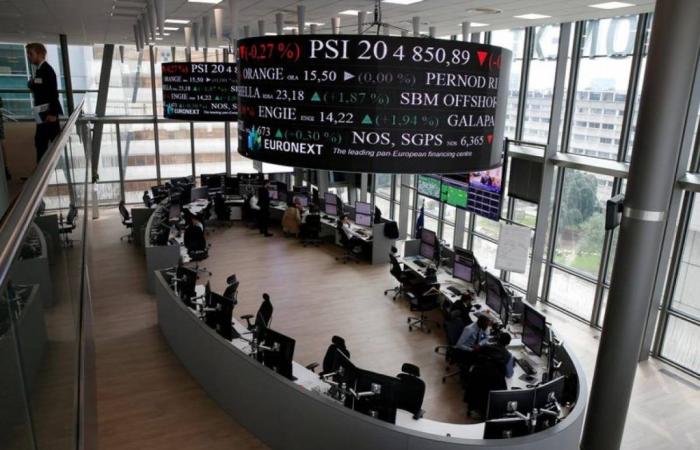
Traders at the headquarters of the stock exchange operator Euronext in the financial district of La Défense
par Yoruk Bahceli
A victory for the left alliance in the legislative elections in France scheduled for June 30 and July 7 could represent a greater risk than that of the far right in the eyes of investors in France, some analysts believe.
The surprise decision of President Emmanuel Macron to call these early elections and the fact that the National Rally (RN) of Marine Le Pen, a party placed on the extreme right, is at the head of voting intentions, have exacerbated concerns about the budgetary situation of France.
The rate gap between the German Bund and the ten-year OAT widened, while the shares of French banks and companies on the CAC 40 fell in the days following the announcement of this election. The decline has since eased without financial assets returning to their levels before the announcement of the dissolution of the National Assembly.
A few days after this shock announcement, the left-wing alliance, united under the label of the “New Popular Front” – and which polls place in second position behind the RN – unveiled an economic program whose spending projects sparked criticism. increased budgetary concerns.
Thus, better results than expected for the “New Popular Front” – which brings together La France insoumise (LFI), the Socialist Party (PS), the French Communist Party (PCF) and Europe Ecologie-Les Verts (EELV) – or even the participation of this alliance in a new government constitutes for some investors and analysts a greater source of concern on the financial markets.
“The worst outcome for the market would be for the left to get a majority… that’s the tail risk,” said Gareth Hill, portfolio manager at Royal London Asset Management.
The “New Popular Front” estimated last week at 125 billion euros for 2024-2025 the cost of its economic program, which plans to increase the minimum wage to 1,600 euros net per month, an increase of 10% in the salaries of civil servants. this year, as well as lowering the retirement age to 60, compared to 64 currently.
According to the left alliance, these expenses would be entirely offset by increases in taxes on inheritance, wealth and multinationals.
While France’s public deficit reached 5.5% of gross domestic product (GDP) in 2023, Eric Coquerel, outgoing deputy of La France insoumise (LFI) recognized last week that this budget deficit would not be reduced if his coalition managed to form a government.
This is a source of concern for investors because the deficit is already beyond the 3% limit set by the European Union, which led the European Commission to open a procedure for excessive public deficits last week. against France.
By comparison, the RN has promised to end the current government’s “budgetary madness” and has committed to conducting an audit of public finances. The RN’s financial adviser, Jean-Philippe Tanguy, told Reuters in an interview published on Monday that his party would end decades of large public deficits and respect European financial rules.
Even if these commitments still have to be put to the test of power, the fact that the RN is at least talking about budgetary responsibility is “reassuring”, underlined Gareth Hill of Royal London Asset Management.
IMPACT ON THE EURO
The fact remains that certain RN projects also frighten the markets because of their costs considered high. These include the project to reduce VAT on energy and fuel and to repeal the pension reform by establishing in particular a retirement age of 60 for people who started working before the age of 20 and contributed 40 annuities.
The RN maintains that its projects can be financed by reducing administrative formalities, eliminating tax loopholes and reducing social spending in favour of immigrants.
Nomura economists, however, note a preference of the financial markets for the far-right party in a choice between the RN and the “New Popular Front”.
“In our opinion, the formation of a government by the ‘New Popular Front’, within the framework of an absolute or relative majority, would be very harmful for the financial markets and would lead to a further widening of the spreads between French and German bonds” , they wrote in a note. They also point out that this would have a negative impact on the euro.
“In many ways, the ‘New Popular Front’ openly rejects the institutions that govern fiscal prudence, much like Liz Truss in the UK,” Nomura writes, referring to the former British prime minister’s unfunded tax cuts that caused turbulence in bond markets in 2022.
Economists at investment bank Jefferies said a left-wing government would be the “worst outcome” for markets if it were the result of the success of Jean-Luc Mélenchon’s party and led to the implementation of a far-left political program.
“We could see increased clashes with the EU,” writes Jefferies, who expects the rate gap between France and Germany – currently around 70 basis points – to widen until ‘at 120 basis points. Such a hypothesis is considered 20% to 25% probable by the intermediary.
“The negative market reaction could last longer and we are not certain that this scenario is compatible with a ‘buy the dip’ strategy,” Jefferies also wrote, referring to buying an asset when the price has fallen. A position that Jefferies recommends for most other hypotheses, including that of an absolute majority for the RN.
(Report by Yoruk Bahceli, with the contribution of Leigh Thomas, French version Claude Chendjou, edited by Blandine Hénault)





